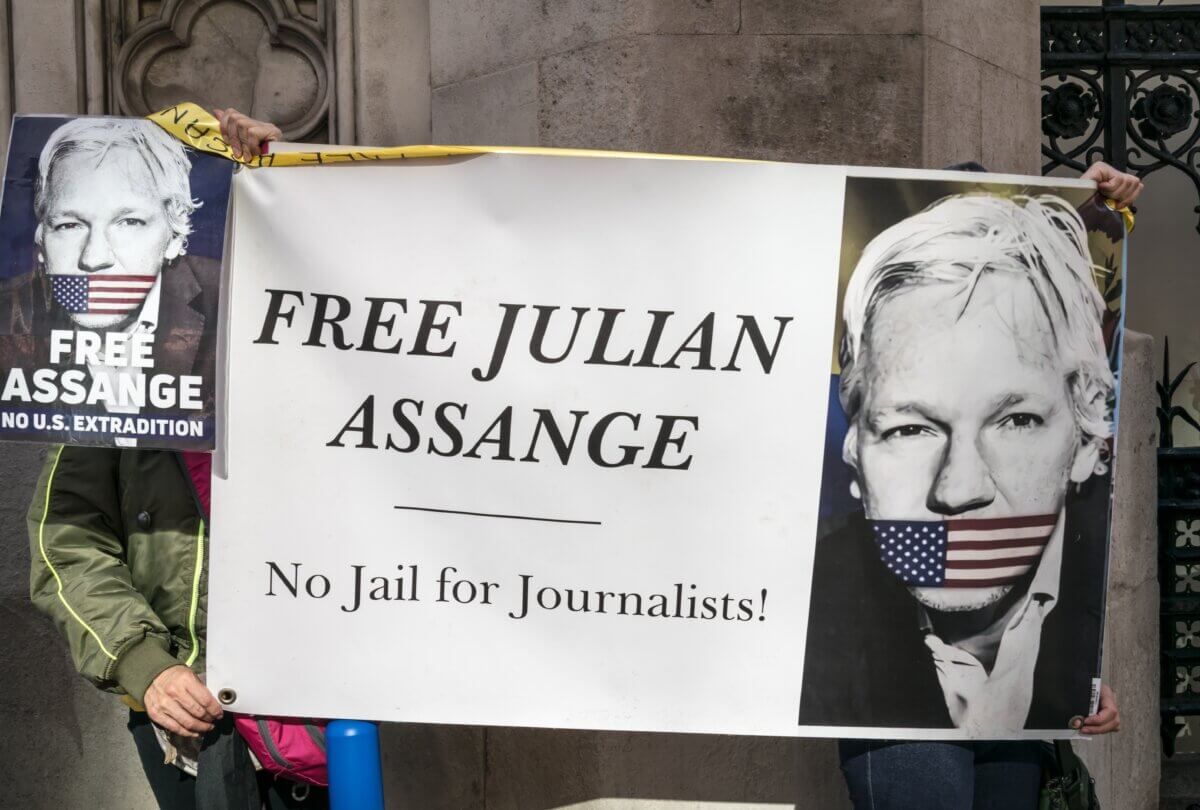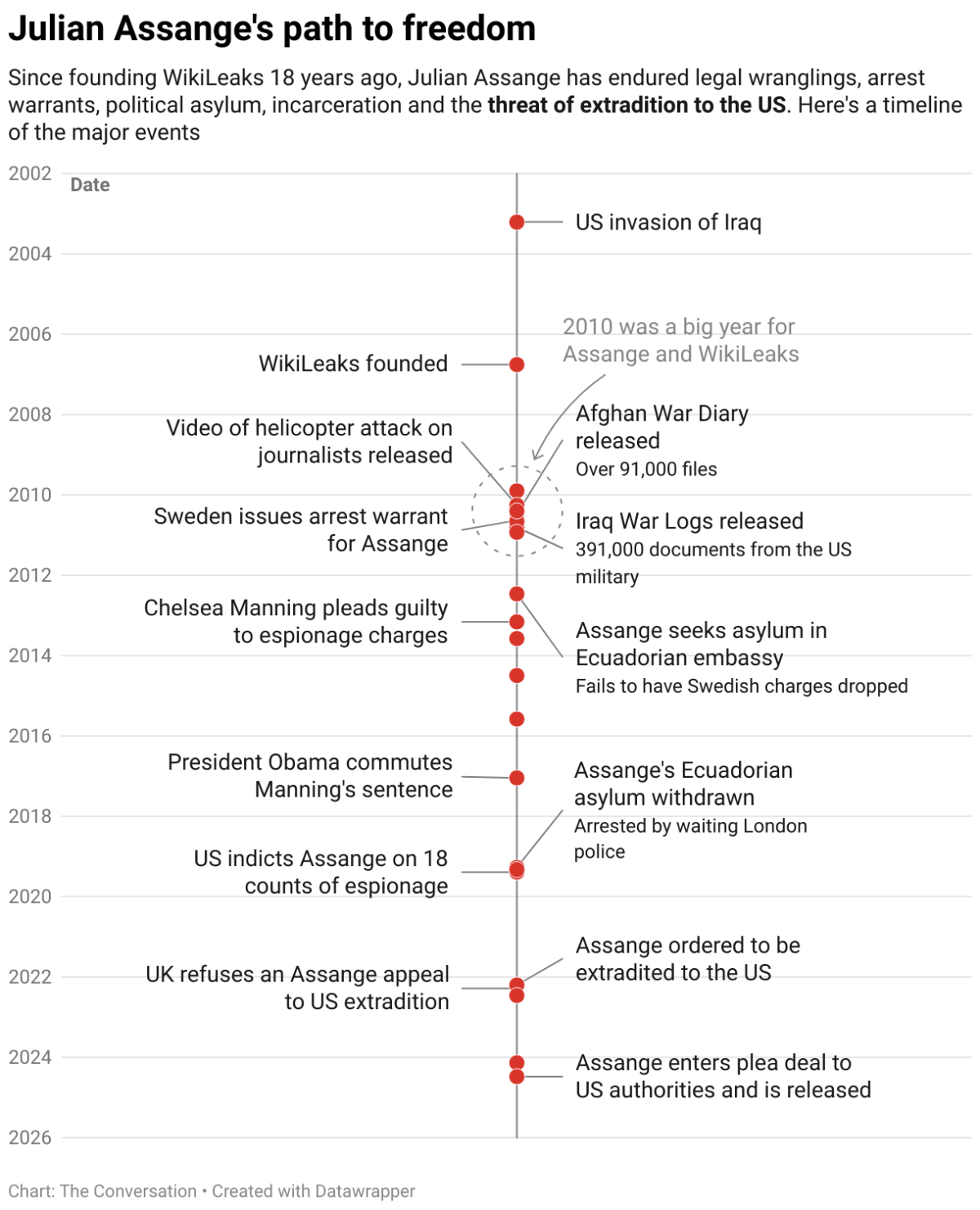
London, England, UK. October 8, 2022. Supporters of WikiLeaks founder Julian Assange take part in a protest near Westminster to protest against Julian Assange's potential deportation to USA.. (Photo by E Ozcan on Shutterstock)
After years of appeals and litigation, WikiLeaks founder Julian Assange has entered into a plea deal with the U.S. government, according to court documents.
He was facing one count of computer misuse and multiple counts of espionage stemming from his work with WikiLeaks, publishing sensitive U.S. government documents provided by Chelsea Manning. The U.S. government had repeatedly claimed that Assange’s actions risked its national security.
Documents filed in the U.S. Federal Court in Saipan, in the Northern Mariana Islands, show Assange will plead guilty to one count under the US Espionage Act. The rest of the charges would be dropped and the request for his extradition to the U.S. would be withdrawn. The U.S. is yet to publicly confirm the deal.
The deal is subject to a hearing and sentencing in Saipan on Wednesday morning, where outlets are reporting Assange will appear in person. He’s been released from London’s Belmarsh prison, with WikiLeaks sharing vision of him en route to London’s Stanstead Airport.
What’s in the deal?
Assange has been granted bail by the UK High Court.
Upon his guilty plea, Assange will be sentenced to 62 months in prison: time he’s already served in Belmarsh. It puts an end to all the ongoing legal action, including the proceedings in the UK High Court and the extradition order from the UK Home Secretary.
The plea deal seems largely consistent with rumors circulating earlier this year. It was widely assumed Assange would plead guilty to one charge, which was expected to be a misdemeanor charge of mishandling documents rather than under the U.S. Espionage Act. The initial rumors also indicated that he would be able to complete the process remotely, whereas he will appear in person before the court.
This is significant as it’s a national security offense for which he’s served more than five years behind bars. This will place limitations on his future travel, including to the U.S., which is unlikely to grant him a visa.
It also sets a practical precedent, if not necessarily a legal one, that a publisher can be convicted under the Espionage Act in the U.S. While the devil will be in the details of the deal, this is what many journalists were afraid of.
It means somebody who did nothing more than receive and publish information has been convicted under major US national security laws. If the deal had been about the Computer Misuse Act, this scenario wouldn’t have arisen. The concern may be that now it’s been done once, it could happen again.

Why is there a deal after all this time?
We may never know the U.S.’ full reasoning, but there are several possibilities as to why it decided to go to a plea deal and not continue with litigation.
The Australian government has been pushing hard for a couple of years now for this case to end. The case for stopping prosecution has had bipartisan support here.
Although not confirming or denying the existence of a plea deal just yet, a spokesperson for the government reiterated Prime Minister Anthony Albanese’s position that there was “nothing to be gained from his [Assange’s] continued incarceration”.
The fact the government has been consistent on this for about two years has changed the political environment for this prosecution.
There’s a growing consensus in the U.S., even among some Republicans, that it’s not in the public interest to continue.
The UK general election will be held next week, and given the anticipated change of government there, the extradition order may have been reconsidered anyway. All of this would likely have informed the U.S.’ cost-benefit analysis to ultimately bring the Assange saga to an end.
What happens now?
Following the hearing in Saipan, Assange will be free to return to Australia. The court was chosen because of Assange’s opposition to travelling to the continental U.S., as well as its proximity to Australia.
Assange will likely find it difficult to travel in the future, given his serious criminal conviction. This may also apply in the UK, where he has also been convicted of absconding from bail, for which he was sentenced to a year’s imprisonment.
Looking further ahead, it’s entirely possible he will be pardoned by the U.S. president, whomever it ends up being after the U.S. election in November. The US allows much more discretion than most in the use of pardons.
For now, Assange will face court in Saipan and come home to Australia, albeit with a serious criminal record.
Holly Cullen is an Adjunct Professor in Law at The University of Western Australia
This article is republished from The Conversation under a Creative Commons license. Read the original article.










